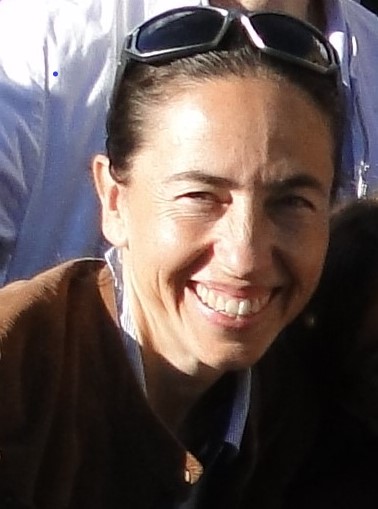
Investigadora Independiente CONICET. Profesora Asociada Cátedra de Diversidad Biológica I, FCEFyN-UNC
E-mail: abecerra@imbiv.unc.edu.ar; abecerra@unc.edu.ar
Títulos: Bióloga. Máster en Ciencias del Suelo (UBA). Doctora en Ciencias Biológicas (UNC)
Resumen de proyecto de investigación
Mis actividades de investigación se centran en el estudio taxonómico de los hongos micorrícico arbusculares asociados a plantas de interés ecológico y agronómico. Además, los estudio para su aplicación en el control biológico de patógenos (nematodos fitófagos), en las reforestaciones y para la biorremediación de suelos contaminados con metales pesados.
Publicaciones más relevantes
Becerra A., K. Pritsch, N. Arrigo, M. Palma & N. Bartoloni. 2005. Ectomycorrhizal colonization of Alnus acuminata Kunth in northwestern Argentina in relation to season and soil parameters. Annals of Forest Science 62: 325-332.
Daniele G., A. Becerra & E. Crespo. 2005. Amanita muscaria (Basidiomycota) y su asociación micorrícica con Cedrus deodara (Pinaceae) en las sierras de Córdoba, Argentina. Boletín de la Sociedad Argentina de Botánica 40 (1-2): 45-49.
Becerra A., M. R. Zak, T. Horton & J. Micolini. 2005. Ectomycorrhizal and arbuscular mycorrhizal colonization of Alnus acuminata from Calilegua National Park (Argentina). Mycorrhiza 15: 525-531.
Becerra A. & M. Cabello. 2008. Hongos micorrícico arbusculares presentes en los bosques de Alnus acuminata (Betulaceae) de la Yunga Argentina. Boletín de la Sociedad Argentina de Botánica 43 (3-4): 197-203.
Becerra A., E. Menoyo, I. Lett & C. L. Li. 2009. Alnus acuminata in dual symbiosis with Frankia and two different ectomycorrhizal fungi (Alpova austroalnicola and Alpova diplophloeus) growing in soilless growth medium. Symbiosis 47: 85–92.
Becerra A., M. Cabello & N. Bartoloni. 2011. Native arbuscular mycorrhizal fungi in the Yungas, Argentina. Mycologia 103: 273-279.
Lax P., A. Becerra, F. Soteras, M. Cabello & M. Doucet. 2011. Effect of arbuscular mycorrhizal fungus Glomus intraradices on the false root-knot nematode Nacobbus aberrans in tomato plants. Biology and Fertility of Soils 47: 591-597.
Soteras F., D. Renison & A. Becerra. 2013. Growth response, phosphorus content and root colonization of Polylepis australis Bitt. seedlings inoculated with different soil types. New Forest 44: 577-589.
Geml J., N. Pastor, L. Fernandez, S. Pachecho, T. Semenova, A. Becerra, C.Y. Wicaksono, & E. Nouhra. 2014. Large-scale fungal diversity assessment in the Andean Yungas forests reveals strong community turnover among forest types along an altitudinal gradient. Molecular Ecology 23: 2452-2472.
Becerra A., J. Bartoloni, N. Cofré, F. Soteras & M. Cabello. 2014. Arbuscular mycorrhizal fungi in saline soils: vertical distribution at different soil depths. Brazilian Journal of Microbiology 45 (2): 585-594.
Pierantozzi P., M. Torres, A. Becerra, D. Maestri, E. Nouhra, E. Trentacoste & C. Puertas 2014. Effects of Different Water Deprivation Levels on Arbuscular Mycorrhizae Fungi Associated to Olives Trees. Acta Horticulturae 1057 (1): 133-140.
Soteras F., G. Grilli, N. Cofré, N. Marro & A. Becerra. 2015. Arbuscular mycorrhizal fungal community changes in high montane forests with different disturbance histories in central Argentina. Applied Soil Ecology 85: 30-37.
Soteras F., B. Moreira, G. Grilli, N. Pastor, D. Renison, M.C. Kasuya, F. de Souza, A. Becerra. 2016. Arbuscular mycorrhizal fungal diversity in rhizosphere spores versus roots of an endangered endemic tree from Argentina: Is fungal diversity similar among forest disturbance types? Applied Soil Ecology 98: 272-277.
Becerra A., J. Bartoloni, N. Cofré, F. Soteras, M. Cabello. 2016. Hongos micorrícico-arbusculares asociados a Chenopodiaceae en dos ambientes salinos de Córdoba. Boletín de la Sociedad Argentina de Botánica 51 (1): 5-13.
Blanco A., M. J. Salazar, C. Vergara Cid, C. Pereyra, L.R. Cavaglieri, A.G. Becerra, M. L. Pignata & J. Rodriguez. 2016. Multidisciplinary study of chemical and biological factors related to lead accumulation in sorghum crops grown in contaminated soils and their toxicological implications. Journal of Geochemical Exploration 166: 18-26.
Cofré N., A. E. Ferrari, A. Becerra, L. Domínguez, L. G. Wall & C. Urcelay. 2017. Effects of cropping systems under no-till agriculture on arbuscular mycorrhizal fungi in Argentinean Pampas. Soil Use and Management 33: 364-378.
Marro N., M. Caccia, M. Doucet, M. Cabello, A. Becerra & P. Lax. 2018. Mycorrhizas reduce tomato root penetration by false root-knot nematode Nacobbus aberrans. Applied Soil Ecology 124: 262-265.
Del Aguila K., Vallejos-Torres G., Arévalo L. & A. Becerra. 2018. Inoculación de Consorcios Micorrícicos Arbusculares en Coffea arabica, variedad Caturra en la Región San Martín. Información Tecnológica 29 (1): 137-146.
Navarro Ramos S., Renison D. & A. Becerra. 2018. La inoculación con hongos micorrícicos arbusculares promueve el crecimiento de plantines de Kageneckia lanceolata (Rosaceae). Boletín de la Sociedad Argentina de Botánica 53(2): 161-167.
Cofré N., C. Urcelay, L.G. Wall, L. Domínguez & A. Becerra. 2018. El potencial de colonización micorrícico-arbuscular varía entre prácticas agrícolas y sitios en diferentes áreas geográficas de la región pampeana. Ecología Austral 28:581-592.
Salazar J., E. Menoyo, V. Faggioli, J. Geml, M. Cabello, J. Rodriguez, N. Marro, A. Pardo, M. L. Pignata & A. Becerra. 2018. Pb accumulation in spores of arbuscular mycorrhizal fungi. Science of the Total Environment 643: 238-246.
Becerra A., A. Diván, D. Renison. 2019. Bare soil cover and arbuscular mycorrhizal community in the first montane forest restoration in central Argentina. Restoration Ecology 27: 804-812.
Faggioli V., Menoyo E., Geml J., Kemppainen M., Pardo A., Salazar J. & Becerra A. 2019. Soil lead-pollution modifies the structure of arbuscular mycorrhizal fungal communities. Mycorrhiza 29:363-373.
Wijayawardene N. et al. Becerra, A. (ubicación 109 de 153 autores). 2020. Outline of Fungi and fungi-like taxa. Mycosphere 11(1): 1060–1456. ISSN 2077 7019.
Financiamiento: Ministerio de Ciencia y Tecnología (MINCyT), Agencia Nacional de Promoción Científica y Tecnológica (FONCyT), Secretaría de Ciencia y Técnica (SECyT), Ministerio de Educación de la Nación.
